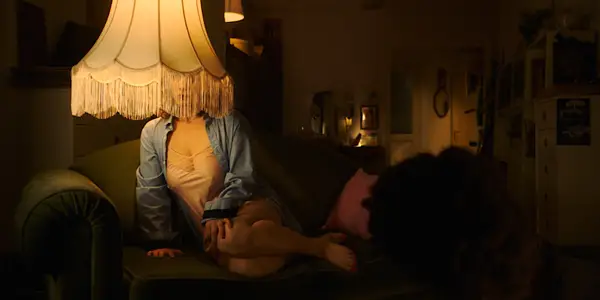I was able to screen two of the films chosen for the SEEfest (The South East European Film Festival Los Angeles) which appeared virtually this year. Both of the films I saw were directed by women, about women, each at a turning point in their lives. Despite this similarity, the two movies were effectually different, each strong in their own intentions.
Cream (Mab) Nóra Lakos, Hungary

Nóra Lakos’ Cream follows Dora (Vica Kerekes), a pastry shop owner reeling from a broken heart. Her recent relationship ended when she found out the man she had fallen for was engaged. As she tries to move on, she grasps onto her business, an adorable bakery with pastries named after romantic film stars (I so very much wanted to eat here).
When she realizes her financial struggle, she decides to look for help. The catch? The organization that she applies to assumes she has a family. Naturally, in rom-com fashion, Dora decides to stretch that lie by asking her young neighbor to be her son and newly met Erik Gyarmati – her husband. Another problem? Her ex is there with his wife, and over the course of a few-day program, when they all stay together and compete, old feelings arise again.
With this expected meet-cute set up, the film moves with familiar patterns. In most ways what unfolds is exactly what you’d expect and yet, that didn’t really bother me. What was unsurprising was still charming and warm, and it made for a cute experience. From the beginning we understand, both from her outlook to her happy-ending romantic film-loving side, that she’s going to learn that romance isn’t perfect, and yet find it anyway. Does it matter that it happens through a composite of romantic tropes? No, because, the sign is basically on the door from the start. You get what you expect, and to boot – a smile going out.
The film avoids diving into deeper issues, rather choosing to go for the safe route. The choice removes the sense of any sort of stakes, thereby making it a riskless endeavor. For the sake of a film like that, I understand, but it does miss out on the full potential. Some of the best romantic comedies have an emotional center beyond just a lovely facade.
Luckily, the cast has a great energy that translates to a lovely chemistry, with the visuals being the icing on the cake. Overall, Cream is an infusion of happiness. Yes, it may be a bit bumptious at times with its intentions, yet you’ll leave with the satisfaction you get from any treat: short-lived, but still enjoyed. In the end, Dora becomes one of those romantic stars she idolizes, putting the final ganache on an (almost) too sweet, confection.
Mare (Andrea Staka), Croatia
Can anyone ever really escape? The question comes up more than once in Mare, while the titular character lives out the thought.
Mare (Marija Skaricic) has fallen into a routine, succumbed to the banal elements of life. A middle-aged mother, she lives in Dubrovnik near an airport with her husband Duro (Goran Navojek) who works security there. She’s looking for something, wanting a job (though her husband rejects that idea for most of the film), she’s looking for agency and an outlet for her restless energy. She watches the planes fly overhead and you can just imagine the destinations and thoughts flowing through her mind.
This isn’t to say she isn’t happy, but it’s clear that she’s headed towards a change. She’s searching for some way to experience herself again, outside of being a mother or a wife. While taking a familiar “mid-life crisis” narrative, we see Mare finding passion again, but in Andrea Staka‘s poignant picture, it’s a gentle examination, executed by a talented cast.
When a new younger neighbor, Piotr (Mateusz Kosiukiewicz) moves in, he immediately catches Mare’s attention. Their first passionate encounter happens in a way that feels (I’ll admit) a bit strange, but she’s quickly thrust into a full-blown affair.
As it begins there’s a noticeable shift in her life, as if light pours over her again. This is obvious in not only how she interacts with Piotra, but with the rest of her children and friends. She’s awoken something that had been slumbering, which makes it even harder to deny. Yet, as it goes on, there are moments where the weight is insufferable and Skaricic portrays that in some beautiful moments.
Her son Gabrijel (G. Vidak), feels his own sort of isolation, and through his challenges, she starts to realize how futile her own ambitions of “escape” might be. Marija Skaricic is wonderful as Mare, imbuing the character with gentle desperation that makes her exploration sympathetic. This isn’t a story that flaunts, and the aesthetic choice of filming on a Super 16mm further helps to make the tale look and feel even more intimate.
The film struggles at times with pacing, and the ending seems rather flippant in comparison to the build-up that we work towards over the film, leaving a lack of resolution with both the viewer and Mare. Despite this, the performances, along with the direction and camera work, make up for it.
In the end, it’s a resignation, an acceptance of some things being relegated to always out of touch. Mare isn’t necessarily needing an escape, as much as she needs to find herself. While there are some leanings on cliches and a lack of significant dramatic moments, there’s a subtly that bodes well with Mare, creating a rather enjoyable thematic interlude into everyday life.
Both of these films were available at this year’s Southeast European Film Festival Los Angeles. For more information on the festival click here.
Does content like this matter to you?
Become a Member and support film journalism. Unlock access to all of Film Inquiry`s great articles. Join a community of like-minded readers who are passionate about cinema - get access to our private members Network, give back to independent filmmakers, and more.